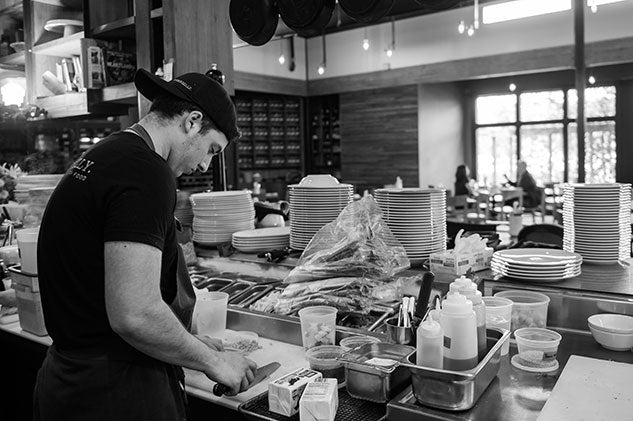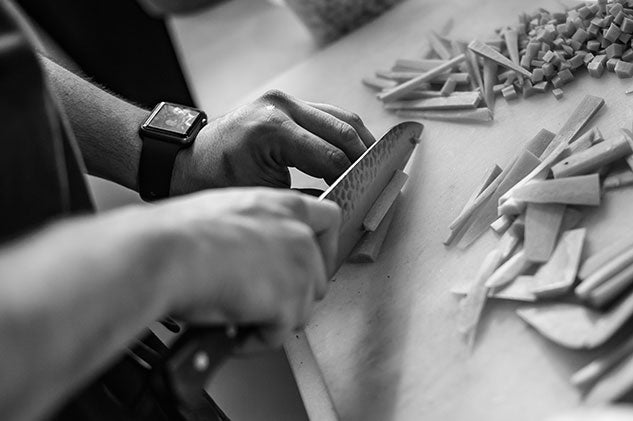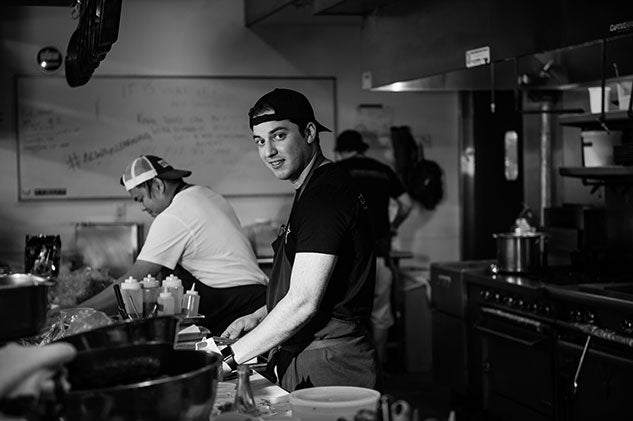Staging 101
So you want to be a chef.

Summer 2017
Whether or not you’ve attended culinary school, at some point in your quest, you’ll apprentice or “stage” (pronounced “stahzh”) in a good restaurant to learn skills and gain experience. The term comes from the French word “stagiaire” and is akin to an unpaid internship. Aspiring chefs work a few days to a few months in a high-end restaurant kitchen, a trial that could lead to an offer of employment. We asked Eduardo Hernandez ’12 to share his story and advice on staging your way into a great kitchen.
1. First, appreciate good food, at home, in cafes or restaurants, wherever you find it.
I grew up eating good food and loving the Puerto Rican food my mom cooked. During the holidays, she’d make a dish called arroz con gandules (rice and pigeon peas) and carne or pollo asado (grilled beef or chicken) — those were some of my favorite dishes growing up.
2. When you get your first apartment after college, don’t eat out all the time.
I got tired of going out and getting pizza and burgers and wanted to eat a little bit healthier, so I started learning to cook. First, simple things, like making rice, omelets and breakfast stuff. That evolved into making risotto and more complicated things to impress my girlfriend at the time.
3. Watch, read and learn — YouTube, Netflix and more.
I ended up getting a job at a small consulting firm in the oil and gas industry and worked as an analyst and then in marketing and publishing at Hart Energy. Most nights, I was cooking, looking at recipes, trying new things and reading about chefs. I’d watch YouTube channels, like Munchies; Netflix series, like “Chef’s Table”; and documentaries like “For Grace” and “Jiro Dreams of Sushi.” One book that everybody reads is Anthony Bourdain’s “Kitchen Confidential.”
4. Buy a bunch of carrots and practice your knife skills, then get a good knife.
I looked up YouTube videos on how to julienne and do other basic cuts. Then, I went to an HEB and bought carrots and onions and just started cutting. That’s by far one of the most important skills, because usually you’ll start at prep [in a professional kitchen] and most of prep is cutting.

5. Hit the streets for a stage.
A friend advised me to simply walk up to a restaurant, ask to talk to the chef and put yourself at his mercy. Be very upfront with him. I said, ‘Look, I don’t have any kitchen experience, but I really want to learn.’ I walked up to a few restaurants and did that very thing. It was a little nerve-racking.
6. It’s OK if it only lasts a few days.
I borrowed my friend’s knife roll and went to [my first restaurant] and helped prep and stayed through service. I did that for a couple days, and it just didn’t pan out.
7. Try again. Any connects?
I got a message from a friend of mine that she knew Chef PJ Stoops of Foreign Correspondents, and she gave him a call. I started staging in July last year, doing prep work, making sauces and curries and helping out; then I started doing salads and desserts and eventually working the fryer station. In August, Bon Appétit came out with its “Top 50 America’s Best New Restaurants” and Foreign Correspondents was on the list. Business tripled, and I started paid, full-time work.
Photo by Jeff Fitlow
8. Go in humble.
The biggest mistake is coming in and thinking you know more than you do. Be as helpful as you can be and never just stand around looking for something to do. A stage is an opportunity for everyone in the kitchen to observe you when you’re going in for a job. The chef sees where you’re at with your skills. All the other cooks see where you’re at with your skills.
9. Try again ...
When Foreign Correspondents closed, PJ started calling other restaurants to see if they needed cooks — and he was giving us recommendations. He connected me with Chef Chris Shepherd at Underbelly. [In 2014, Shepherd was named Best Chef: Southwest by the James Beard Foundation.] I went in and was ready to stage that night. The next day they offered me a job. I prepped and worked the sauté station, which is where their famous Korean braised goat and dumplings dish is made.

